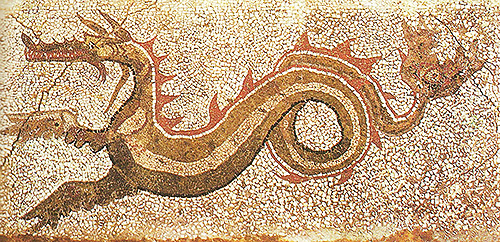Smaug, entitlement, and the rich
by John MacBeath Watkins
In an effort to recover from the action-adventure film, Bilbo Baggins and the Temple of Doom, I've been reading the rather bucolic novel it was based on, and ran across this passage, about Smaug noticing that Bilbo has stolen a golden cup:
When the poor pull an Oliver, like this:
Conservatives complain about a culture of entitlement. But what do you call it when a rich man wants a tax cut, or a tax exemption for donating money to an "educational" non-profit that works to cut Social Security and food stamps, or a public subsidy for constructing a place for his football/basketball/baseball team to play their expensive games?
Smaug displays this sense of entitlement, raging against the theft of a bauble and feeling justified in wreaking havoc against those less powerful. He is a miser, sleeping on his bed of gold while creating devastation around him, a powerful and wealthy disaster for the country all around. I doubt Tolkien knew or cared much about economics, about the way the gold standard had impoverished Britain at the beginning of the recession until the nation abandoned it, or how rearmament was pulling the nation out of the recession while he was writing the book, but perhaps all this entered his narrative on some unconscious level.
Tolkien's influences probably are strongest before the Depression or WW II. He began writing The Book of Lost Tales while recovering from illnesses stemming from his service at The Battle of the Somme, after all.
But if you think about it, Smaug took a great deal of wealth out of circulation and prevented much commerce from occurring, partly by frying and eating anyone who tried to create any wealth by farming near his lair. Old Smaug was a depression all his own self.
In an effort to recover from the action-adventure film, Bilbo Baggins and the Temple of Doom, I've been reading the rather bucolic novel it was based on, and ran across this passage, about Smaug noticing that Bilbo has stolen a golden cup:
"Thieves! Fire! Murder! Such a thing had not happened since he came to the Mountain. His rage passes description -- the sort of rage that is only seen when rich folks that have more than they can enjoy suddenly lose something that they have long had but have never before used or wanted. His fire belched forth, and he shook the mountain-roots...To hunt the whole mountain 'til he had caught the thief and had torn and trampled him was his one thought."J.R.R. Tolkien was an Oxford Don, and would have educated the offspring of some of the wealthiest people in England, so I assume he knew whereof he spoke.
When the poor pull an Oliver, like this:
Conservatives complain about a culture of entitlement. But what do you call it when a rich man wants a tax cut, or a tax exemption for donating money to an "educational" non-profit that works to cut Social Security and food stamps, or a public subsidy for constructing a place for his football/basketball/baseball team to play their expensive games?
 |
| Ancient Greek mosaic from Caulonia - Italy, via Wikipedia. |
Tolkien's influences probably are strongest before the Depression or WW II. He began writing The Book of Lost Tales while recovering from illnesses stemming from his service at The Battle of the Somme, after all.
But if you think about it, Smaug took a great deal of wealth out of circulation and prevented much commerce from occurring, partly by frying and eating anyone who tried to create any wealth by farming near his lair. Old Smaug was a depression all his own self.
Comments
Post a Comment